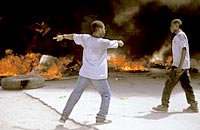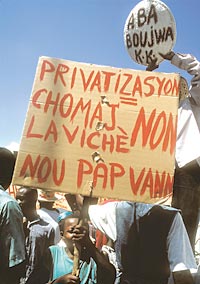Untitled Document
 |
|
Students burn tyres in support of their striking teachers
|
As the Caribbean republic of Haiti goes to the polls this month, Andrew
Taylor reports on how imperialism has shattered a poor nation
‘We are going to intervene in the coming days. I think there will be
collateral damage but we have to impose our force, there is no other way.”
These words could very easily come from a US general in Iraq announcing an
attack on an insurgent stronghold. They certainly carry the same tone of callous
disregard for innocent lives.
They were, however, spoken by Juan Gabriel Valdes, head of the United Nations
(UN) mission to Haiti, referring to the slum of Cité Soleil on the northern
outskirts of the capital Port-au-Prince.
The escalating undeclared war in Cité Soleil, which has taken scores
of lives in the last couple of months, pits the UN stabilisation force (Minustah)
against armed gangs, variously described as supporters of ousted president Jean-Bertrand
Aristide, drug traffickers, kidnappers or outside provocateurs.
Whatever the truth, the UN force have long demanded the “aggressive cleansing”
of an area that is seen as a stronghold of support for ex-president Aristide
and of resistance to the neoliberal “restructuring” on the
Caribbean island.
The impact of these policies has been to make Haiti, in the words of one commentator,
“the most open economy in the world”. Agriculture, which most Haitians
rely on for subsistence, has all but been destroyed. A country that was once
self-sufficient in food is now dependent on aid and remittances from Haiti’s
large overseas community to stave off starvation.
The lowering, or outright abolition, of protective tariffs on foodstuffs, demanded
as a condition for the granting of financial aid, has meant that the small peasants
and sharecroppers who scraped a living off the land now compete with dumped
cheap foreign imports and “food aid”.
The outcome of this unequal competition is that the poorest are driven off
the land to swell the pools of human misery in the urban slums like Cité
Soleil, or attempt the perilous sea trip to an uncertain future in a foreign
land – a journey many do not survive. Those who remain are compelled to
turn to the cash crop of last resort – cutting down what few trees are
left for charcoal production, and making Haiti’s ecological catastrophe
worse.
The immediate background to the violence in Cité Soleil, which is mirrored
in the rest of the country, is the drive to hold presidential and parliamentary
elections, which are currently scheduled for 7 February.
These elections represent an attempt to bring legitimacy to a state that has
been run by unelected US-appointed officials since Aristide was forced from
office two years ago by an armed revolt by former members of the military.
Shattered dream
 |
A protest against neo-liberalism in
the capital, Port-au-Prince. The placard reads, “no to privatisation,
unemployment and high prices. We are not for sale” (Pics:
Leah Gordon/www.leahgordon.co.uk)
|
Few people, however, believe the elections hold out any hope for an
improvement to the desperately miserable lives of the bulk of the population.
None of the contending parties or candidates offer a programme that would reverse
the damage done by following the neo-liberal plan, nor relieve the phenomenal
wealth inequalities and exploitation that characterise Haitian society.
Furthermore, many question the legitimacy of elections that have already been
postponed five times due to incompetence, poor infrastructure, corruption, violence
and general cynicism.
Elections are seen as a sick joke when the estimated 500,000 inhabitants of
Cité Soleil are under siege by an occupying army, or ruled by self-appointed
armed thugs, where 40 percent of the population haven’t received polling
cards and where some will have to walk for up to six hours to cast their vote.
Finally, a large number of Haitians, despite the disillusionment caused by
his time in office, regard the exiled Aristide as the legitimate president and
the “missing candidate”. René Préval, his former deputy,
is currently seen as a front runner.
How did the Haitian dream turn so sour? Haiti is a country whose history should
be close to every socialist’s heart.
Occupying the western third of the Caribbean island of Hispaniola (shared with
the Dominican Republic), Haiti emerged from the ashes of the French slave colony
of Saint Domingue as the world’s first independent black republic in 1804.
Inspired by the French Revolution’s ideals of liberty, equality and fraternity,
as well as by their African animist-based religion, the slaves had risen up
and taken on their masters.
In the course of a bloody decade-long struggle, armies of freed slaves led
by such heroic figures as Toussaint L’Ouverture and Jean-Jacques Dessalines
defeated armies sent by the world’s then superpowers – France, Spain
and Britain – to restore slavery.
In the wake of independence, international isolation and a war-shattered economy
kept the new nation in thrall to a succession of vicious despots, culminating
in the notorious Duvalier dictatorships (1957-86).
A massive popular uprising in 1986 overthrew the regime of Jean Claude “Baby
Doc” Duvalier and the feared Tonton Macoutes militia he had inherited
from his father, known as “Papa Doc”. Many hoped this episode heralded
the dawn of a brave new era for the desperately impoverished nation.
Instead, Haiti today is the shattered dream of those who laid down their lives
in those struggles.
By far the poorest country in the Western Hemisphere, Haiti ranks among the
very worst countries in the world in terms of life expectancy, infant mortality,
HIV infection, literacy, access to healthcare or clean water, income per capita,
debt, corruption and environmental degradation.
Some see the logical extension of the current occupation being to declare Haiti
a “failed state” and the establishment of some sort of protectorate.
This would indeed be the sad, final nail in the coffin of a heroic enterprise.
The most common approach by so-called development experts is to describe Haiti
as the archetypal basket case that is incapable of self-rule and will never
be more than a headache for the international community.
Far from being an ill-judged experiment in black self-rule that was always
doomed to failure, the post-independence history of Haiti is one of interference,
aggression and invasion by foreign powers.
At first the young republic, once it had shown that it could not easily be
militarily subjugated, was put in international quarantine by the great powers
who feared it might provide a dangerous example to their slaves.
The US did not recognise Haiti for 58 years and only did so during the American
Civil War, its own life and death struggle against slavery.
Other powers did not recognise Haiti until 1825, when it was forced to pay
a huge indemnity to the former slave power, France. This payment effectively
meant that the descendants of slaves were being asked to pay for their forefathers’
freedom. It also represented the beginning of the cycle of debt that still crushes
the poor today and keeps the state in hock to foreign and international financial
institutions.
The cycle of foreign interference continued into the 20th century, culminating
in the US invasion and occupation of 1915-34. Prompted by concern for US interests
in the region, the marines were sent in. Their brutal racist approach was summed
up by their bemusement at dealing with “niggers who spoke French”.
The main legacy of the US occupation was the creation of the Haitian army,
a force whose sole mission has been internal repression and the propping up
of grotesque dictatorships sympathetic to US foreign policy goals.
Thus, the otherwise reviled Duvalier dictatorships were seen by the US as embarrassing
but steadfast bulwarks against “world Communism” (for which read
local liberation movements). This was especially true after Cuba was “lost”.
Haiti’s more recent history is no less replete with examples of foreign
interference.
In 1990 former Catholic priest Aristide became Haiti’s first democratically
elected president in living memory, carried to power by a landslide after a
promise to champion the poor. The US state department saw him as a dangerous
leftist and a threat to their policy goals.
Almost immediately, the US embassy in Port-au-Prince began conspiring with
the Haitian army top brass and economic elite, who were themselves deeply unhappy
at the turn of events.
The result of these machinations was quick to be felt. Aristide was thrown
from power and forced into exile by a violent military coup barely eight months
after coming to office.
Brutality
The incredible brutality of the resulting military regime produced an international
outcry, compounded by the arrival of thousands of desperate Haitian boat people
along the Florida coast.
The then US president, Bill Clinton, was prompted to reassess US policy toward
the country, although this did not stop US coastguards holding boat people illegally
at the Guantanamo Bay detention centre before “renditioning” them
to the mercies of the Haitian military.
The new approach adopted under Clinton meant returning Aristide to office,
but only after effectively rendering him incapable of making any substantial
changes that would benefit the Haitian masses or impede US goals.
Aristide was forced to accept that his three years in exile should be counted
as part of his term in office (the Haitian constitution bars presidents from
serving consecutive terms). He was made to agree to the terms set out by the
international financial institutions and forced to accept that the bloody activities
of the regime would go unpunished.
A suitably de-clawed Aristide was then shipped back to Haiti. Predictably,
his government, and that of his successor René Préval, was weakened
by the concessions and incapable of reversing the decline in standards of living
experienced by Haiti’s poor.
The disillusionment with the “people’s champion” meant that
although he was re-elected in 2000, turnout was low and support lukewarm.
This proved crucial in early 2004, when disgruntled former members of the army
he had disbanded in 1995 took up arms against him. Unlike previous occasions,
Haiti’s poor were not prepared to rise up and defend Aristide. He left
the presidential palace for exile once again with an escort of US soldiers,
prompting further controversy over the role of the US, as well as with that
of France, which fatally weakened him by publicly asking for him to resign.
To those that say Haiti is a basket case and demand more foreign intervention
to save it from anarchy, socialists must respond that too much foreign intervention
is what has kept the Haiti down.
At every turn, grassroots organisations of Haitian workers, peasants and the
urban poor have shown their resilience and will to organise for a better life.
It is solidarity with their fight, not foreign occupation or phoney elections
that represent the way forward.
Andrew Taylor is a socialist who has lived and worked
in Haiti.
For more on information on Haiti go to www.haitisupport.gn.apc.org

